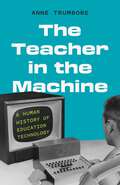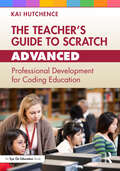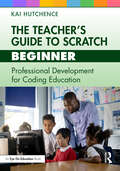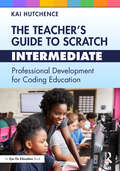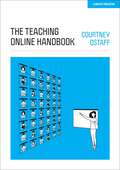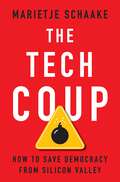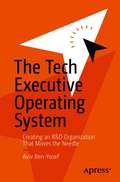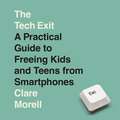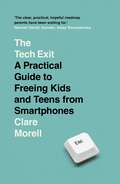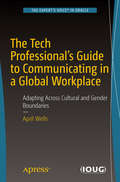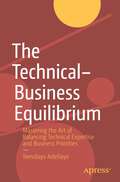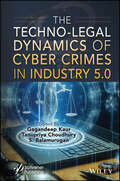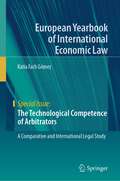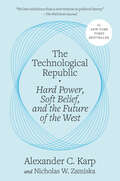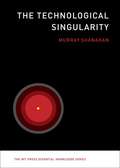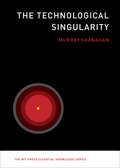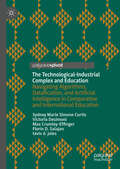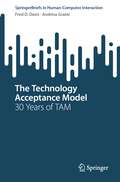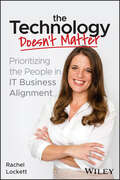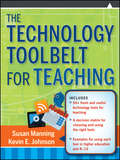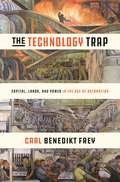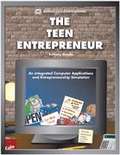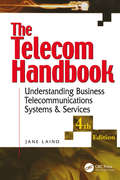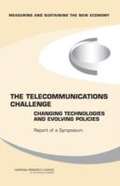- Table View
- List View
The Teacher in the Machine: A Human History of Education Technology
by Anne TrumboreThe surprising history of education technology and its political, financial, and social impact on higher education and our worldFrom AI tutors who ensure individualized instruction but cannot do math to free online courses from elite universities that were supposed to democratize higher education, claims that technological innovations will transform education often fall short. Yet, as Anne Trumbore shows in The Teacher in the Machine, the promises of today&’s cutting-edge technologies aren&’t new. Long before the excitement about the disruptive potential of generative AI–powered tutors and massive open online courses, scholars at Stanford, MIT, and the University of Illinois in the 1960s and 1970s were encouraged by the US government to experiment with computers and artificial intelligence in education. Trumbore argues that the contrast between these two eras of educational technology reveals the changing role of higher education in the United States as it shifted from a public good to a private investment.Writing from a unique insider&’s perspective and drawing on interviews with key figures, historical research, and case studies, Trumbore traces today&’s disparate discussions about generative AI, student loan debt, and declining social trust in higher education back to their common origins at a handful of elite universities fifty years ago. Arguing that those early educational experiments have resonance today, Trumbore points the way to a more equitable and collaborative pedagogical future. Her account offers a critical lens on the history of technology in education just as universities and students seek a stronger hand in shaping the future of their institutions.
The Teacher’s Guide to Scratch – Advanced: Professional Development for Coding Education
by Kai HutchenceThe Teacher’s Guide to Scratch – Advanced is a practical guide for educators preparing sophisticated coding lessons and assignments in their K–12 classrooms. The world’s largest and most active visual programming platform, Scratch helps today’s schools answer the growing call to realize important learning outcomes using coding and computer science. This book illustrates the expert-level potential of Scratch coding, details effective pedagogical strategies and learner collaborations, and offers actionable, accessible troubleshooting tips. Geared toward the advanced user, these four unique coding projects will provide the technical training that teachers need to master Scratch, feeling comfortable and confident in their skills as they unlock the program’s full potential for themselves and their students. Clear goals, a comprehensive glossary, and other features ensure the project’s enduring relevance as a reference work for computer science education in grade school. Thanks to Scratch’s cost-effective open-source license, suitability for blended and project-based learning, notable lack of privacy or security risks, and consistency in format even amid software and interface updates, this will be an enduring practitioner manual and professional development resource for years to come.
The Teacher’s Guide to Scratch – Beginner: Professional Development for Coding Education
by Kai HutchenceThe Teacher’s Guide to Scratch – Beginner is a practical guide for educators preparing beginners-level coding lessons and assignments in their K–12 classrooms. The world’s largest and most active visual programming platform, Scratch helps today’s schools answer the growing call to realize important learning outcomes using coding and computer science. This book illustrates the benefits and fundamental building blocks of Scratch coding, details effective pedagogical strategies and learner collaborations, and offers actionable, accessible troubleshooting tips. Geared toward the fledgling user, these four unique coding projects will provide the technical training that teachers need to feel comfortable and confident in their skills and to help instill the same feeling of accomplishment in their students. Clear goals, a comprehensive glossary, and other features ensure the project’s enduring relevance as a reference work for computer science education in grade school. Thanks to Scratch’s cost-effective open-source license, suitability for blended and project-based learning, notable lack of privacy or security risks, and consistency in format even amid software and interface updates, this will be an enduring practitioner manual and professional development resource for years to come.
The Teacher’s Guide to Scratch – Intermediate: Professional Development for Coding Education
by Kai HutchenceThe Teacher’s Guide to Scratch – Intermediate is a practical guide for educators preparing moderately complex coding lessons and assignments in their K-12 classrooms. The world’s largest and most active visual programming platform, Scratch helps today’s schools answer the growing call to realize important learning outcomes using coding and computer science. This book illustrates the increasingly intricate affordances of Scratch coding, details effective pedagogical strategies and learner collaborations, and offers actionable, accessible troubleshooting tips. Geared toward the intermediate user, these four unique coding projects will provide the technical training that teachers need to feel comfortable and confident in their skills and to help instill the same feeling of accomplishment in their students. Clear goals, a comprehensive glossary, and other features ensure the project’s enduring relevance as a reference work for computer science education in grade school. Thanks to Scratch’s cost-effective open-source license, suitability for blended and project-based learning, notable lack of privacy or security risks, and consistency in format even amid software and interface updates, this will be an enduring practitioner manual and professional development resource for years to come.
The Teaching Online Handbook
by Courtney OstaffClassroom teachers are increasingly expected to teach online – creating content area courses from scratch with little support or training. But high-quality, researched-based online teaching has its own particular set of skills and expectations, and most resources are directed at college-level instructors. This no-nonsense handbook is for that busy classroom teacher, with clear techniques for planning, instruction, and assessment, as well as sections on teaching students with diverse needs and exceptionalities. Based on the author's real-life experiences as an online teacher, there are multiple examples including sample assignments across content areas, rubrics for grading, and sample scripts for parent contact as well as tips to reduce instructor workload and conduct successful live instruction.
The Teaching Online Handbook
by Courtney OstaffClassroom teachers are increasingly expected to teach online – creating content area courses from scratch with little support or training. But high-quality, researched-based online teaching has its own particular set of skills and expectations, and most resources are directed at college-level instructors. This no-nonsense handbook is for that busy classroom teacher, with clear techniques for planning, instruction, and assessment, as well as sections on teaching students with diverse needs and exceptionalities. Based on the author's real-life experiences as an online teacher, there are multiple examples including sample assignments across content areas, rubrics for grading, and sample scripts for parent contact as well as tips to reduce instructor workload and conduct successful live instruction.
The Tech Coup: How to Save Democracy from Silicon Valley
by Marietje SchaakeAn insider offers a &“forceful critique...of Big Tech's steady erosion of democracy&” (The New Yorker) and describes what must be done to stop itOver the past decades, under the cover of &“innovation,&” technology companies have successfully resisted regulation and have even begun to seize power from governments themselves. Facial recognition firms track citizens for police surveillance. Cryptocurrency has wiped out the personal savings of millions and threatens the stability of the global financial system. Spyware companies sell digital intelligence tools to anyone who can afford them. This new reality—where unregulated technology has become a forceful instrument for autocrats around the world—is terrible news for democracies and citizens.In The Tech Coup, Marietje Schaake offers a behind-the-scenes account of how technology companies crept into nearly every corner of our lives and our governments. She takes us beyond the headlines to high-stakes meetings with human rights defenders, business leaders, computer scientists, and politicians to show how technologies—from social media to artificial intelligence—have gone from being heralded as utopian to undermining the pillars of our democracies. To reverse this existential power imbalance, Schaake outlines game-changing solutions to empower elected officials and citizens alike. Democratic leaders can—and must—resist the influence of corporate lobbying and reinvent themselves as dynamic, flexible guardians of our digital world.Drawing on her experiences in the halls of the European Parliament and among Silicon Valley insiders, Schaake offers a frightening look at our modern tech-obsessed world—and a clear-eyed view of how democracies can build a better future before it is too late.
The Tech Executive Operating System: Creating an R&D Organization That Moves the Needle
by Aviv Ben-YosefLeaders of tech organizations have to regularly adapt their strategies in an ever-changing market. Creating a culture that understands and supports both the technical and the nontechnical is a refined skill that can be difficult to master even for a leader with years of experience. The Tech Executive Operating System helps you apply your personal expertise and build a thriving R&D organization that moves the needle.Tech companies spend an average of 15% of their revenue on R&D. As they grow, they find the return on this large investment decreases at a fast pace. Executives and leaders of companies big and small are at a loss and seeking guidance. Author Ben-Yosef expertly walks you through the need to set goals, translate business objectives to R&D terms, and establish the organizational structures and processes to create the biggest impact. The Tech Executive Operating System is a rare book that provides useful yardsticks to measure the progress and contributions of managers, teams, and individuals in your organization. Tech executives, first-time startup founders, managers , CEOs, and other non-technical founders of startups who want to better understand a significant part of their organization all have invaluable knowledge to gain from The Tech Executive Operating System. Ben-Yosef’s thorough research and real-world examples enhance the lessons and make your goals clear. Engineering organizations can be vastly improved by this multi-faceted approach, and the future of tech is calling for it.What You Will LearnCreate a toolkit for your employees to put in place a remarkable engineering teamDiscover an impact-oriented approach to goal-setting that will be especially usefully for remote employeesTurn the R&D department from a cost center to an innovation centerWho This Book is ForTech executives and their direct reports, first-timer startup founders, junior leaders in tech organizations, middle-managers in big enterprises, CEOs and other non-technical founders of startups who want to better understand a big part of their organization and how best to address it.
The Tech Exit: A Practical Guide to Freeing Kids and Teens from Smartphones
by Clare MorellIt's no secret that addictive digital technologies like smartphones and social media apps are harming a generation of kids socially, mentally, and even physically. But a workable solution seems elusive. After all, don't kids need phones, and won't they be vulnerable or socially isolated without tech?Clare Morell, fellow at the Ethics and Public Policy Center and director of its Technology and Human Flourishing Project, argues that the answer is 'no'. She exposes the lies parents have been sold about managing the dangers of tech through parental controls and screen-time limits, and demonstrates that another way is possible - even if your children are already using smartphones or social media.The Tech Exit maps a doable pathway to freedom from digital technology for families, local communities, and society. Drawing on dozens of interviews with experts and with families who have gone tech-free, as well as Morell's own work as a policy expert, The Tech Exit shows how digital technology is anything but necessary for children to live happy, healthy, and socially full lives.The Tech Exit is essential reading for any parent who has felt stuck between an awareness of the dangers of digital technology for kids and the feeling that tech is necessary and inevitable. Clare Morell's message is simple and compelling: You and your family can be free. The life you want for your children is within reach.
The Tech Exit: A Practical Guide to Freeing Kids and Teens from Smartphones
by Clare MorellIt's no secret that addictive digital technologies like smartphones and social media apps are harming a generation of kids socially, mentally, and even physically. But a workable solution seems elusive. After all, don't kids need phones, and won't they be vulnerable or socially isolated without tech?Clare Morell, fellow at the Ethics and Public Policy Center and director of its Technology and Human Flourishing Project, argues that the answer is 'no'. She exposes the lies parents have been sold about managing the dangers of tech through parental controls and screen-time limits, and demonstrates that another way is possible - even if your children are already using smartphones or social media.The Tech Exit maps a doable pathway to freedom from digital technology for families, local communities, and society. Drawing on dozens of interviews with experts and with families who have gone tech-free, as well as Morell's own work as a policy expert, The Tech Exit shows how digital technology is anything but necessary for children to live happy, healthy, and socially full lives.The Tech Exit is essential reading for any parent who has felt stuck between an awareness of the dangers of digital technology for kids and the feeling that tech is necessary and inevitable. Clare Morell's message is simple and compelling: You and your family can be free. The life you want for your children is within reach.
The Tech Professional's Guide to Communicating in a Global Workplace: Adapting Across Cultural And Gender Boundaries
by April WellsInformation technologists are increasingly being made part of global teams, and are confronting the challenges of communicating across a variety of linguistic and cultural boundaries. This book helps you know what to say, what not to say, and even where to sit in meetings and in social situations.The Tech Professional's Guide to Communicating in a Global Workplace shows you how to effectively communicate across a variety of different cultures within and across organizations. You will become aware of cultural differences from one country or region to another, between various groups at the local level, and across groups such as developers to DBAs, IT staff to business people, women to men, people approaching retirement to people coming into the organization fresh out of college, and more. The author provides her personal experiences and shares anecdotes as well as lessons learned, key takeaways, and references for further reading. Whether it is face to face, over the phone, via email or instant messenger, or in a presentation, meeting, or report, the ability to communicate effectively is critical.What You'll LearnConcisely communicate with the right audience in the right wayWrite emails that are understood and get the results you wantImprove personal reputation as an effective communicatorCommunicate across cultural boundaries without offendingPresent the desired impression in business situationsGrow professionally by adjusting your communication styleWho This Book Is ForProgrammers and system administrators, including database administrators
The Technical–Business Equilibrium: Mastering the Art of Balancing Technical Expertise and Business Priorities
by Temidayo AdefioyeLearn how to make the right technical decisions to achieve your organization's business objectives. This book is a guide for software engineers who are responsible for making technical decisions that impact the business objectives of their organization. You'll start by reviewing business priorities, technical decision-making, and see how to overcome common challenges. Using real world case studies, this book offers a comprehensive overview of the skills and strategies required for senior engineers to effectively navigate complex technical and business challenges. You will also gain advice on building trust and credibility with business stakeholders and communicating technical challenges and opportunities to them.The Technical-Business Equilibrium reveals practical strategies for assessing technical feasibility and risk, selecting the best solutions to meet your company's goals, and communicating those decisions to business stakeholders. What You Will Learn Utilize techniques for evaluating technical feasibility and riskCommunicate technical decisions to business stakeholders clearly and effectivelyGain insights into managing competing prioritiesManage technical debts and build a solid engineering culture Who This Book is For Senior engineers with several years of experience in the software development industry who have most likely advanced through the ranks of technical roles and are now in positions of leadership or decision-making within their organization.
The Techno-Legal Dynamics of Cyber Crimes in Industry 5.0 (Industry 5.0 Transformation Applications)
by S. Balamurugan Tanupriya Choudhury Gagandeep KaurThis book explores the core principles, technological advancements, and legal challenges of Industry 5.0’s digital transformation. Industry 5.0 has enhanced the operational efficiency of the entire manufacturing process by incorporating multiple emerging technologies; however, high-tech cybercrimes have prompted legal scholars worldwide to rethink the fundamental principles of technology and law. The Techno-Legal Dynamics of Cyber Crimes in Industry 5.0 shows how advanced technologies, such as artificial intelligence, the Internet of Things, and robotics, are integrated within manufacturing environments. It explores the intricate relationship between legal systems and technological advancements and addresses the rise of cybercrime following Industry 5.0’s digital transformation. Focusing on the interaction between technology and law, the book investigates current cyberlaw issues and solutions. It draws insights from diverse experts, including scholars, legal professionals, and industry leaders, emphasizing effective regulations to minimize cyber threat risks for Industry 5.0. By adopting an international viewpoint, this book sheds light on various dimensions of nascent cybercrimes and legislative efforts worldwide aimed at governing them effectively. Audience This book should be read by legal scholars, lawyers, judges, legal and information technology researchers, cybersecurity experts, computer and software engineers, and students of law and technology. Regulators, policymakers, international trade specialists, and business executives should read it as well.
The Technological Competence of Arbitrators: A Comparative and International Legal Study (European Yearbook of International Economic Law)
by Katia Fach GómezArbitration is facing revolutionary changes due to new technologies’ irruption into the entire arbitration proceeding. Wide-ranging technical-legal concepts such as e-discovery, e-hearing, cyber-security protocol, e-deliberations, algorithmic decision-making and digital signing have become part of life. Technology’s impact on arbitration is unlikely to decrease after the COVID crisis; on the contrary, how the arbitration community positions itself vis-à-vis technology will be a key factor in determining arbitration’s future. Faced with this challenging scenario, the book discusses a novel legal topic: arbitrators’ relationship with this increasingly ubiquitous, rapidly-changing technology. This innovative book applies journalism’s “5 W questions” to the underexplored issue of arbitrators’ digital competence. It reaches a workable definition of what digital competence in the current arbitration context is, also providing answers to the essential question of why arbitrators’ digital competence is relevant from legal and financial points of view. Attention then shifts to who, with reflections on arbitrators working in a highly technological context and clarification of their relationship with other legal and non-legal actors. The book equally offers an in-depth comparative study of the question of where arbitrators’ technological competence is regulated, with critical analysis of soft and hard law provisions that may impose a digital competence duty. Finally, the book specifies when arbitrators need to be digitally competent and develops legal proposals regarding key procedural stages (initial conference, hearings) and legal topics (cybersecurity, data protection). The first study to scrutinise the rapidly changing relationship between arbitrators and technology, the book aims to spark a crucial debate among practitioners and scholars. Academically rigorous and using the latest legal material, it emphasises arbitrators’ needs, rights and duties in our technological age, presenting them alongside carefully selected practical topics. The unprecedented and well-grounded proposals for arbitrators’ digital competence are intended to be a call to action for its broad target audience.
The Technological Republic: Hard Power, Soft Belief, and the Future of the West
by Alexander C. Karp Nicholas W. ZamiskaFrom the Palantir co-founder, one of tech’s boldest thinkers and The Economist’s “best CEO of 2024,” and his deputy, a sweeping indictment of the West’s culture of complacency, arguing that timid leadership, intellectual fragility, and an unambitious view of technology’s potential in Silicon Valley have made the U.S. vulnerable in an era of mounting global threats. <p> “Fascinating and important.”—Walter Isaacson, #1 New York Times bestselling author of Elon Musk <p> ONE OF FINANCIAL TIMES’ MOST ANTICIPATED BOOKS OF THE YEAR <p> Silicon Valley has lost its way. Our most brilliant engineering minds once collaborated with government to advance world-changing technologies. Their efforts secured the West’s dominant place in the geopolitical order. But that relationship has now eroded, with perilous repercussions. Today, the market rewards shallow engagement with the potential of technology. Engineers and founders build photo-sharing apps and marketing algorithms, unwittingly becoming vessels for the ambitions of others. This complacency has spread into academia, politics, and the boardroom. The result? An entire generation for whom the narrow-minded pursuit of the demands of a late capitalist economy has become their calling. <p> In this groundbreaking treatise, Palantir co-founder and CEO Alexander C. Karp and Nicholas W. Zamiska offer a searing critique of our collective abandonment of ambition, arguing that in order for the U.S. and its allies to retain their global edge—and preserve the freedoms we take for granted—the software industry must renew its commitment to addressing our most urgent challenges, including the new arms race of artificial intelligence. The government, in turn, must embrace the most effective features of the engineering mindset that has propelled Silicon Valley’s success. Above all, our leaders must reject intellectual fragility and preserve space for ideological confrontation. A willingness to risk the disapproval of the crowd, Karp and Zamiska contend, has everything to do with technological and economic outperformance. At once iconoclastic and rigorous, this book will also lift the veil on Palantir and its broader political project from the inside, offering a passionate call for the West to wake up to our new reality. <b>New York Times Bestseller</b>
The Technological Singularity
by Murray ShanahanThe idea that human history is approaching a "singularity" -- that ordinary humans will someday be overtaken by artificially intelligent machines or cognitively enhanced biological intelligence, or both -- has moved from the realm of science fiction to serious debate. Some singularity theorists predict that if the field of artificial intelligence (AI) continues to develop at its current dizzying rate, the singularity could come about in the middle of the present century. Murray Shanahan offers an introduction to the idea of the singularity and considers the ramifications of such a potentially seismic event. Shanahan's aim is not to make predictions but rather to investigate a range of scenarios. Whether we believe that singularity is near or far, likely or impossible, apocalypse or utopia, the very idea raises crucial philosophical and pragmatic questions, forcing us to think seriously about what we want as a species. Shanahan describes technological advances in AI, both biologically inspired and engineered from scratch. Once human-level AI -- theoretically possible, but difficult to accomplish -- has been achieved, he explains, the transition to superintelligent AI could be very rapid. Shanahan considers what the existence of superintelligent machines could mean for such matters as personhood, responsibility, rights, and identity. Some superhuman AI agents might be created to benefit humankind; some might go rogue. (Is Siri the template, or HAL?) The singularity presents both an existential threat to humanity and an existential opportunity for humanity to transcend its limitations. Shanahan makes it clear that we need to imagine both possibilities if we want to bring about the better outcome.
The Technological Singularity (The MIT Press Essential Knowledge series)
by Murray ShanahanThe idea of technological singularity, and what it would mean if ordinary human intelligence were enhanced or overtaken by artificial intelligence.The idea that human history is approaching a “singularity”—that ordinary humans will someday be overtaken by artificially intelligent machines or cognitively enhanced biological intelligence, or both—has moved from the realm of science fiction to serious debate. Some singularity theorists predict that if the field of artificial intelligence (AI) continues to develop at its current dizzying rate, the singularity could come about in the middle of the present century. Murray Shanahan offers an introduction to the idea of the singularity and considers the ramifications of such a potentially seismic event.Shanahan's aim is not to make predictions but rather to investigate a range of scenarios. Whether we believe that singularity is near or far, likely or impossible, apocalypse or utopia, the very idea raises crucial philosophical and pragmatic questions, forcing us to think seriously about what we want as a species. Shanahan describes technological advances in AI, both biologically inspired and engineered from scratch. Once human-level AI—theoretically possible, but difficult to accomplish—has been achieved, he explains, the transition to superintelligent AI could be very rapid. Shanahan considers what the existence of superintelligent machines could mean for such matters as personhood, responsibility, rights, and identity. Some superhuman AI agents might be created to benefit humankind; some might go rogue. (Is Siri the template, or HAL?) The singularity presents both an existential threat to humanity and an existential opportunity for humanity to transcend its limitations. Shanahan makes it clear that we need to imagine both possibilities if we want to bring about the better outcome.
The Technological-Industrial Complex and Education: Navigating Algorithms, Datafication, and Artificial Intelligence in Comparative and International Education
by Florin D. Salajan tavis d. jules Max Crumley-Effinger Sydney Marie Curtis Victoria DesimoniThis Pivot book looks at the ways in which disruptive technologies, datafication, and Artificial Intelligence (AI) are shaping Comparative and International (CIE) Education and leading to its platformization. CIE entails the study of foreign educational systems in comparative perspective to discern what can be learned from approaches in various educational contexts and how these approaches might be applicable to other educational systems. The advent of advanced technologies, particularly AI, has been a game changer for research, teaching, and learning methods. It is within this context and at the intersection of deglobalization (and the retreat towards regionalization) and the rise of the fourth industrial revolution—that blends the biological, physical, and cyber-physical together—that this project seeks to describe the benefits and consequences of datafication and AI for the field of CIE.
The Technology Acceptance Model: 30 Years of TAM (Human–Computer Interaction Series)
by Fred D. Davis Andrina GranićThis SpringerBrief discusses the origins, emergence, evolution, and future of the Technology Acceptance Model (TAM). TAM, simple yet powerful, has been extensively validated, standing as a leading scientific paradigm and a reliable model for explaining, predicting, and improving user acceptance across a spectrum of technological deployments. Over more than three decades since the introduction of TAM, numerous extensions have emerged, incorporating additional variables and collectively referred to as “TAM++”. However, perceived usefulness and perceived ease of use remain the basic beliefs of the core TAM model. The introductory chapter “Once upon a TAM” focuses on the challenging search for a user acceptance crystal ball, showing that it is indeed possible to consistently predict, explain, and improve user acceptance. “Evolution of TAM” traces the model's growth and adaptability, exploring the proliferation of selected TAM-related behavioural intention models, several integrated theoretical approaches, the quest for other behavioural intention antecedents, and TAM’s versatile applications in various contexts. “Revolution of TAM” presents an in-depth systematic review, encompassing a meta-analysis of selected TAM reviews and meta-analyses, and a narrative review of representative primary studies, providing a thorough and extensive understanding of the TAM universe. The epilogue “What will the Future of TAM be Like?” provides insights into its dynamic future. This SpringerBrief concludes with seven actionable principles, serving as a strategic guide for those aiming to customize the TAM++ body of knowledge for application-oriented studies within a particular context. This comprehensive overview of TAM is a valuable source of information for researchers, practitioners, and all interested readers, especially those new to the field.
The Technology Doesn't Matter: Prioritizing the People in IT Business Alignment
by Rachel LockettDiscover the secret to productive IT-business alignment In The Technology Doesn’t Matter: Prioritizing the People in IT Business Alignment, veteran IT executive Rachel Lockett delivers an engaging and insightful discussion of how to turn around IT departments struggling to effectively collaborate with their business counterparts. In the book, you’ll explore the proven and established People-Process-Technology framework and break down innovative approaches to IT-business alignment in a clear and accessible style. The author explains how to “manage up” and “manage down” to create inter- and intra-departmental synergy, as well as: How to identify the four types of business leaders, and the ways they can contribute to an effective IT business alignment Practical solutions to even the most seemingly intractable technology alignment problems Hands-on professional development guidance for IT and business leadersAn essential and original resource for executives, managers, directors, founders, entrepreneurs, and other business leaders, The Technology Doesn’t Matter will also appeal to tech leaders and technology service providers seeking to better communicate with non-technical professionals. It’s also a practical handbook for business leaders who want to better understand, relate to, and collaborate with their IT colleagues, improve engagement and retention amongst IT employees, and align the interests of technical and non-technical professionals.
The Technology Toolbelt for Teaching
by Susan Manning Kevin E. JohnsonInstructors are pressured to integrate technology into their traditional or online instruction. This book offers a hands-on resource that shows how to integrate technology into lessons and offers information about common technologies, categorizing by groups, and explains the purposes they serve pedagogically as well as how they can be most effectively used in online or face-to-face classrooms. In addition to examples, each chapter will feature a decision making matrix to help instructors decide on whether or not a tool is really needed based on curriculum objectives or a specific organizational or curricular problem.
The Technology Trap: Capital, Labor, and Power in the Age of Automation
by Carl Benedikt FreyHow the history of technological revolutions can help us better understand economic and political polarization in the age of automation From the Industrial Revolution to the age of artificial intelligence, The Technology Trap takes a sweeping look at the history of technological progress and how it has radically shifted the distribution of economic and political power among society’s members. As Carl Benedikt Frey shows, the Industrial Revolution created unprecedented wealth and prosperity over the long run, but the immediate consequences of mechanization were devastating for large swaths of the population. Middle-income jobs withered, wages stagnated, the labor share of income fell, profits surged, and economic inequality skyrocketed. These trends, Frey documents, broadly mirror those in our current age of automation, which began with the Computer Revolution.Just as the Industrial Revolution eventually brought about extraordinary benefits for society, artificial intelligence systems have the potential to do the same. But Frey argues that this depends on how the short term is managed. In the nineteenth century, workers violently expressed their concerns over machines taking their jobs. The Luddite uprisings joined a long wave of machinery riots that swept across Europe and China. Today’s despairing middle class has not resorted to physical force, but their frustration has led to rising populism and the increasing fragmentation of society. As middle-class jobs continue to come under pressure, there’s no assurance that positive attitudes to technology will persist.The Industrial Revolution was a defining moment in history, but few grasped its enormous consequences at the time. The Technology Trap demonstrates that in the midst of another technological revolution, the lessons of the past can help us to more effectively face the present.
The Teen Entrepreneur: An Integrated Computer Applications and Entrepreneurship Simulation
by Anthony MasalaThis simulation has been developed to provide teenage-level students with an in-depth, real-world experience in creating a comprehensive business plan for a student-selected teen-based business. The Teen Entrepreneur contains a collection of 21 individual projects designed to give students hands-on practice in using their computer skills to create a variety of standard business plan documents and marketing materials for their own business.
The Telecom Handbook: Understanding Telephone Systems and Services
by Jane LainoWhether you're an IT professional, a telecom professional, an office administrator, or just starting out in the business world, this book provides you with an organized, easy-to-use introduction to business telecommunications systems and services. It does
The Telecommunications Challenge: Changing Technologies And Evolving Policies
by National Research Council of the National AcademiesStarting in the mid 1990s, the United States economy experienced an unprecedented upsurge in economic productivity. Rapid technological change in communications, computing, and information management continue to promise further gains in productivity, a phenomenon often referred to as the New Economy. To better understand the sources of these gains and the policy measures needed to sustain these positive trends, the National Academies Board on Science, Technology, and Economic Policy (STEP) convened a series of workshops and commissioned papers on Measuring and Sustaining the New Economy. This workshop, entitled “The Telecommunications Challenge: Changing Technologies and Evolving Policies,” brought together leading industry representatives and government officials to discuss issues generated by the rapid technological change occurring in the telecommunications industry and the regulatory and policy challenges this creates. The workshop presented a variety of perspectives relating to developments in the telecommunications industry such as the potential of and impediments to broadband technology.
